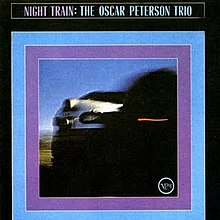Night Train (Oscar Peterson album)
| Night Train | ||||
|---|---|---|---|---|
 |
||||
| Studio album by The Oscar Peterson Trio | ||||
| Released | 1963 | |||
| Recorded | December 15 & 16, 1962 | |||
| Studio | Los Angeles, California | |||
| Genre | Jazz | |||
| Length | 67:40 (1997 CD re-release) | |||
| Label | Verve | |||
| Producer | Norman Granz | |||
| The Oscar Peterson Trio chronology | ||||
|
||||
| Professional ratings | |
|---|---|
| Review scores | |
| Source | Rating |
| Allmusic |
|
| The Rolling Stone Jazz Record Guide | |
Night Train is an album by the Oscar Peterson Trio, released in 1963 by Verve Records. It was one of Peterson's most commercially successful recordings.
Album producer Norman Granz had sold the record label Verve, but remained Peterson's manager, and so supervised the Night Train recording session. The brief duration of many of the tracks has been attributed to a desire to have them played on commercial radio, which was reluctant to play any tracks longer than a few minutes.
The cover art photograph is by Pete Turner and original sleeve notes were by Benny Green.
On the title track, "After the opening theme choruses, Peterson slips into a 2-chorus solo. Then the theme returns, and we realize that all the while, the band has gotten softer and softer. This leads into Brown's solo, which is unaccompanied to start, and then adds, in turn, Peterson and Thigpen. When Peterson comes in for another chorus of solo, everything starts to build again. Peterson plays a boogie figure in the bass to build the intensity, and then the trio plays a simple but effective shout chorus and then goes back to the theme with a strong crescendo to nearly the end, with a traditional Count Basie tag to close the track. By using the basic elements of crescendo and diminuendo, and arranged sections to set off the parts, Peterson turns what could have been a throwaway into a minor masterpiece."
Ed Thigpen's rivet cymbal, recorded at very close range, is prominent on all issues of the album.
Writing for AllMusic, critic John Bush wrote the release "includes stately covers of blues and R&B standards"The Penguin Guide to Jazz included it in its core collection, claiming "it's one of the best long-players of the period" and that Peterson's playing is "tight and uncharacteristically emotional".
Diana Krall reported that listening to the album made being a jazz pianist her ambition.
(Tracks 12 through 17 are CD bonus tracks, not included on the original vinyl LP)
...
Wikipedia
